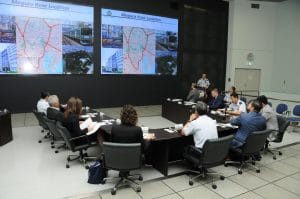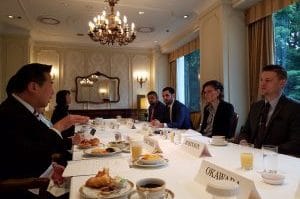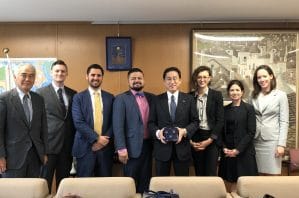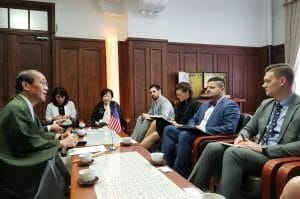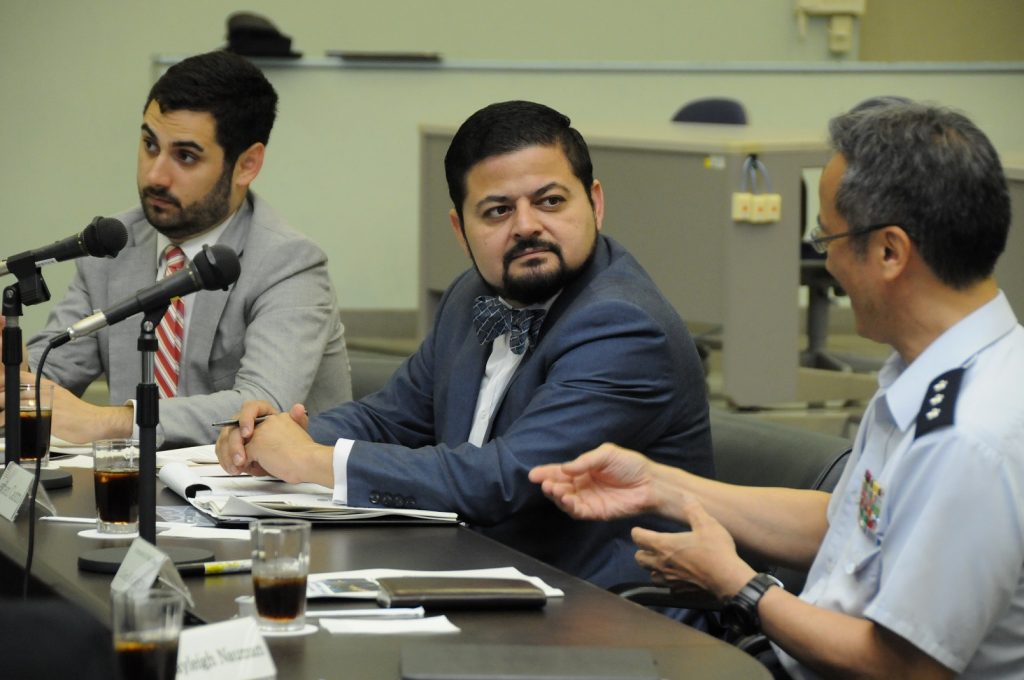A delegation of six US Congressional staff took part in an intensive, weeklong series of roundtables, briefings, and site visits in Japan as part of JCIE’s US Congressional Staff Exchange Program. The delegation, which was split between Republican and Democratic aides, traveled to Tokyo and Kyoto on May 26 to June 2, 2018, for a series of meetings with a wide range of Japanese leaders, government representatives, and policy experts for discussions about the dynamics shaping Japanese politics and the US-Japan alliance.
The group, met with more than 75 leaders and policy experts in Tokyo and Kyoto to discuss bilateral security and economic relations. During the course of their visit, they sat down with a total of 10 Diet members, including former Foreign Minister Fumio Kishida—who holds one of the top posts in the ruling Liberal Democratic Party (LDP) as chair of its Policy Research Council—as well as opposition party leaders and junior cabinet members. They also talked with executives from leading companies about trade and their investments in the United States and exchanged views on US-Japan relations with the governor of Kyoto Prefecture as well as Kyoto City’s mayor.
Participants
JEYBEN CASTRO, Outreach Director, US Senate Republican Task Force on Hispanic Affairs, Senate Finance Committee (Sen. Orrin Hatch, R-UT)
MATTHEW FUENTES, Health Legislative Aide, Office of House Minority Leader Chuck Schumer (D-NY)
KAYLEIGH NAUMAN, Legislative Correspondent, Office of Representative Sean Patrick Maloney (D-NY)
NATHAN ROBINSON, Professional Staff, Senate Committee on Appropriations Subcommittee on Transportation, Housing and Urban Development (D)
LINDSAY STEWARD, Professional Staff, US House Committee on Ways and Means (R)
BETH VRABEL, Senior Health Counsel, Senate Finance Committee (Democratic Staff)
Summary of Discussions
Shoring up the US-Japan alliance
Former Foreign Minister Kishida and the other Diet members who spoke with the delegation emphasized how urgent it is for the United States and Japan to further deepen their alliance in light of the dramatic shifts we are seeing in the balance of power in Asia. Several argued that, as authoritarian regimes are extending their influence, it is critical for Japan and the United States, as the leading proponents of democratic governance and freedom in the region, to play a greater role in consolidating the rules-based international order. Meanwhile, Japanese and American diplomats who briefed the group, as well as the commandant of the Japan Self-Defense Forces Air Staff College, Lt. Gen. Jun Nagashima, discussed the variety of concrete steps being taken to implement US-Japan alliance cooperation on the ground.
Deepening Concern over Chinese influence
Japanese analysts and policymakers expressed particular concern about how China seems to be taking advantage of confusion surrounding the Trump administration’s foreign policy aims to further extend its own influence in the region. Several were worried about how China has stepped up its use of infrastructure funding and other economic incentives to deepen its leverage over regional governments, while the United States has walked away from trade deals and dialed down its engagement in the region. One prominent Diet member also warned that China is clearly preparing to challenge the US naval predominance in the region, and that should be a greater priority for both Japan and the United States.
North Korea
Unsurprisingly, relations with North Korea were a hot topic, especially since the delegation visit came less than two weeks before Chairman Kim Jung-un and President Donald Trump were due to have their historic first meeting. Both ruling and opposition party lawmakers welcomed US-DPRK dialogue as preferable to more saber-rattling, although several expressed skepticism about how the United States might handle negotiations after the initial meeting. A number of senior Japanese experts also went out of their way to stress the point that, while Japanese leaders acknowledge that their country should be prepared to commit funding as part of a comprehensive denuclearization agreement, they eventually expects to have a seat at the negotiation table as part of the process of getting to this point.
Trade Tensions
A wide range of Japanese leaders, including one of Japan’s most senior trade negotiators, expressed deep concern over the resurgence of US-Japan trade tensions and voiced the hope that US-Japan economic discussion be shifted from more transactional approaches back toward a greater emphasis on rules-based trade. The delegation met with almost 20 Japanese business executives during the course of their visit, and many were perplexed over the America First trade policies that are being rolled out. While several had some worries over the recent steel and aluminum tariffs that target Japanese exports, most claimed to be more concerned about the potential damage to their companies’ business from a US withdrawal from NAFTA and further weakening of the global trading system.
Exchanging Lessons on Common Domestic Challenges
Delegation members also spoke with a range of experts and leaders about three areas where the United States can draw lessons from the Japanese experience—healthcare, transportation infrastructure, and urban sustainability. Several Diet members and one of the country’s top healthcare experts described how Japan has managed to control medical costs in order to manage a healthcare system that has one of the world’s most successful outcomes at a fraction of the price of the US system. This system, which depends predominantly on private healthcare providers, however, is coming under intense fiscal pressures as Japan’s population rapidly ages. Meanwhile, senior Ministry of Transportation officials and executives from one of the country’s largest railways, JR Central, briefed the group on how Japan finances its nationwide network of high-speed rail. Then, when the delegation visited Kyoto, they spoke about local efforts to pursue urban sustainability and economic revitalization with Kyoto Prefectural Governor Takatoshi Nishikawa, Kyoto Mayor Daisaku Kadokawa, local government officials, and NGO leaders.

